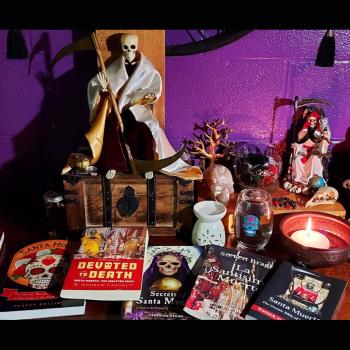But we are not among those who shrink back and so are lost, but among those who have faith and so are saved. (Hebrews 10:39,NRSV)
This past weekend I interviewed Lost writer and producer Damon Lindelof in front of a ballroom full of people at the Austin Film Festival—and yes, it was as cool as it sounds. We talked about Damon's work on Star Trek and Prometheus, he told stories about what's it like to get a phone call from Sir Ridley Scott, who made Alien, Thelma & Louise, and Gladiator, and I got tons of ideas for the book on the afterlife in popular culture I'm writing for Oxford University Press.
But for me, the most important thing was the reminder (as we come to the final days of this general election in a deeply fragmented nation) that we live and die together, rise or fall together. It's a point Damon makes often in his work. In the beginning of Lost, the series' central character, Jack (Matthew Fox), a deeply broken person (like all those on the show), addressed the lost survivors of a plane crash in words he probably needed to hear as much as any of them: "If we can't live together, we're going to die alone."
What Jack meant in that phrase, which was repeated in one version or another through the show's run, and has echoes in Damon's plots for Lost, Prometheus, and Star Trek, is that we are social beings, that we are better together than on our own, and that in fact, we need each other.
On one level, we know that we need to be part of a gathering of people larger than ourselves. Throughout history, we have banded together to do the things we can't do on our own, and for all our bickering about what government should and shouldn't do, we know we need to be part of a larger society, in part because we know we need to transcend our own selfishness. I wrote in Faithful Citizenship that
Self-interest still generally determines which candidates and policies we support, whether in church or secular politics. The philosopher Thomas Hobbes wrote in Leviathan, his treatise on human nature and government, that human beings are naturally competitive, seeking their own best interests. Government exists, according to this Hobbesian view, to arbitrate these conflicts. We sometimes think of this as a very secular understanding of human nature—and of why we band together in larger communities. Some would call it a cynical understanding. But Augustine argued similarly that given the fallen nature of humankind and our disordered desires, we need government to tell us what to do and how to treat each other. We need an institution that can "over-awe" us (to use Hobbes' phrase) and restrain our selfish impulses.
Government should, Augustine suggests, achieve at least these two positive outcomes: a state of peace, and "the material conditions under which its citizens can lead a decent life as human beings." (Donald Burt, Friendship and Society, 124-25) Augustine echoes Hobbes in noting that since "all in the human community are driven by personal passions to pursue their private desires," the basic state of human society is "one of conflict and war where the weak are oppressed by the strong." (City of God, 18.2.) Government then, should exist to create a sense of justice and equity, to protect the weak and restrain the strong, and to allow human beings to flourish.
But what Damon Lindelof reminded me of in our conversation on Saturday is that we need each other not just for the sake of safety, but for our soul's sake. We become who we are meant to be together (which is a classic understanding of ecclesia, the gathering of believers Jesus talks about in the Gospel of Matthew).
The sixth season of Lost contains a strange feature that aficionados of the show call the Sideways World or the Flash Sideways (as opposed to the dramatic terms Flashback and Flash Forward). [Spoiler Alert: If somehow you haven't heard about the end of Lost, you might want to skip the rest of this paragraph.] At the end of the final episode, this Sideways World was revealed to be a purgatory of some sort, a term Damon embraced in our interview, saying that the idea of putting these characters in Purgatory "was very much in the DNA of the show," and that this mutual purgatory was the concept they had in mind from the time they got the go-ahead from the network to eventually end Lost.





